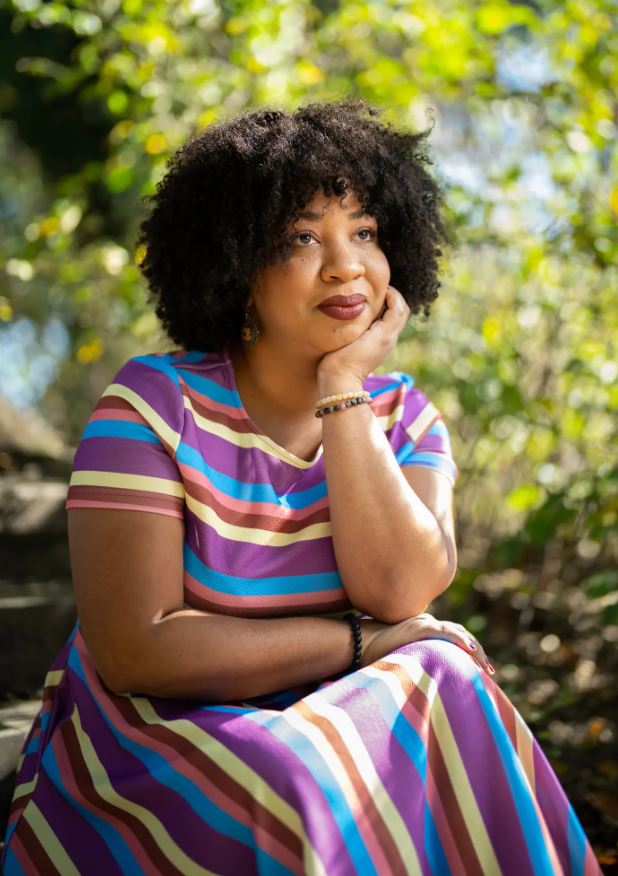Courtney Bryan, a talented pianist and composer, may not be a household name in contemporary music, but her innovative compositions and unique approach are poised to change that. While her musical journey includes two independent jazz-leaning albums released in 2007 and 2010, her work remains largely under the radar.
Born in New Orleans and recently honored with the MacArthur “genius” grant, the 41-year-old artist has been leaving her mark since earning her doctorate in composition from Columbia University in 2014. Her compositions have attracted the attention of symphony orchestras, chamber musicians, vocal groups, and jazz performers. Notably, her composition “Gathering Song,” performed by the New York Philharmonic last spring, marked her as one of the most exciting voices in contemporary American music, blending post-bop jazz harmony and text by stage director Tazewell Thompson.
Bryan’s musical journey began by navigating two distinct worlds: classical and jazz, while also working as an organist at the Bethany Baptist Church in Newark. However, her time at Columbia University, guided by her mentor George E. Lewis, a distinguished composer, trombonist, and computer-music pioneer, encouraged her to break down the barriers between these genres and dream bigger.
Columbia introduced Bryan to like-minded individuals, including musicologist Matthew D. Morrison. Their conversations have significantly influenced Morrison’s forthcoming book, “Blacksound,” which seeks to expand the understanding of what constitutes Black music. Bryan’s remarkable talents and her humility set her apart even during the competitive admissions process at Columbia. Once she embarked on her studies, she played a pivotal role in reshaping the program’s culture, which was known for its harsh critique and unkind treatment of students. Her deep spiritual reservoir and her courage to advocate for a more respectful and supportive environment made a significant impact.
Courtney Bryan’s ongoing relationship with George E. Lewis continues today. Lewis leads the International Contemporary Ensemble and programmed a performance featuring Bryan as part of “Composing While Black: Volume One.” This event is closely related to Lewis’s latest book, a collection of critical essays he co-edited with Harald Kisiedu.
One of the remarkable aspects of Bryan’s work is her direct approach to political commentary. She was one of the early proponents of introducing the Black Lives Matter movement to classical music. Her compositions carry a powerful message, yet they do not conform to conventional tonal or atonal classifications. The lushness of her orchestrations is often balanced with moments of sparseness, creating a unique and evocative listening experience.
Bryan’s composition “DREAMING” is a prime example of her distinctive style. It incorporates text from a dissent by Justice Ketanji Brown Jackson and other legal opinions.
Bryan’s ability to bring together diverse influences is evident in her composition “Yet Unheard,” which commemorates the life of Sandra Bland, a Black woman who died in a Texas jail cell in 2015 after a traffic stop. This piece seamlessly blends experimental orchestration with gospel traditions. Similarly, her composition “Sanctum,” performed by the London Sinfonietta, weaves influences from the sermons of Pastor Shirley Caesar, marching band percussion, and the rhythmic exultations of street protests.
Bryan’s religious background plays a significant role in her work, evident in her composition “Requiem.” This piece incorporates text from the Mass in Greek and Latin, alongside selections from Ecclesiastes and Psalm 23 in English. It was performed on video by members of the Chicago Symphony Orchestra and the treble-voice quartet Quince Ensemble during the pandemic. Quince Ensemble member Kayleigh Butcher notes that Bryan’s use of extended techniques, such as whispering and chanting, is distinctive in contemporary music. Bryan’s ability to combine these extended techniques with traditional chamber writing sets her work apart.
Bryan’s recent composition, “House of Pianos,” is a piano concerto bustling with references to jazz-piano history, including boogie-woogie and Harlem stride. It reflects her lessons with Ellis Marsalis, a renowned New Orleans pedagogue, and her studies with jazz pianist Stanley Cowell at Rutgers. The piece is a tribute to pianists who have inspired her and presents a challenge, both as a pianist and composer. Bryan performed the solo part during its premiere with the Cincinnati Symphony Orchestra in May.
While Courtney Bryan’s recent accomplishments are gaining well-deserved recognition, her early recordings offer a glimpse of her exceptional talent. Her rendition of “City Called Heaven” from her first album, “Quest for Freedom,” showcases her ability to transform spiritual music through experimental rhythmic touches and “Chopinesque” figurations. Her unique approach seamlessly combines various musical elements, leaving listeners captivated.
In the ever-evolving landscape of contemporary music, Courtney Bryan stands as a visionary composer and pianist. Her ability to transcend musical boundaries, blend diverse styles, and address pressing social issues through her compositions establishes her as a rising star in the world of music. Her recent accolades, including the MacArthur “genius” grant, reflect the growing recognition of her innovative and influential work. With each composition, she invites listeners to explore new dimensions of sound and meaning, making her an artist to watch in the years to come.

